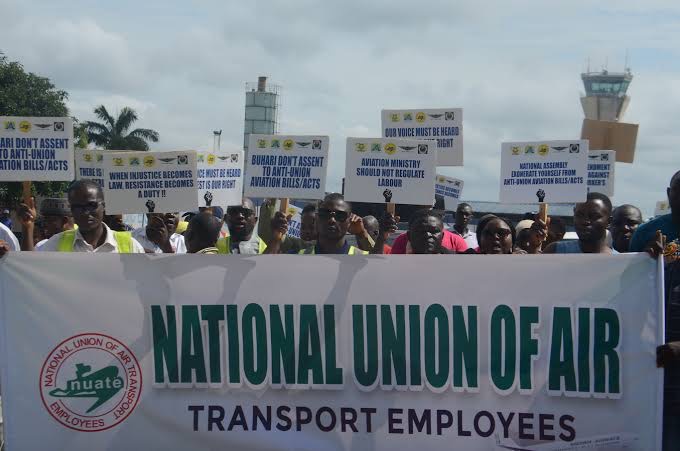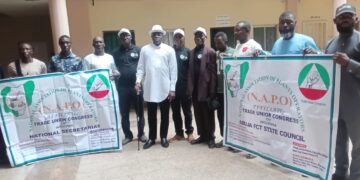In a continued effort to address the controversial issue surrounding the deduction of 50 percent of the Internally Generated Revenues (IGRs) of aviation agencies into the Treasury Single Account (TSA), the Federal Government has initiated further discussions.
Mr. Festus Keyamo, the Minister of Aviation, has called on key union leaders within the aviation sector to attend a meeting in Abuja. The deduction policy has raised concerns among the unions, leading to planned protests that have since been suspended following the minister’s intervention.
The invitation for this crucial meeting was contained in a letter dated September 20, 2024, with reference number PS/FMA/PC/S.017/265. The letter, signed by Dr. Emmanuel Meribole, the Permanent Secretary of the Ministry of Aviation, and obtained by Journalists, formally scheduled the meeting for Monday, September 23, 2024.
The meeting is to be held in the minister’s conference room in Abuja. The letter was addressed to various aviation unions, including the National Union of Air Transport Employees (NUATE), the Association of Nigeria Aviation Professionals (ANAP), the National Association of Aircraft Pilots and Engineers (NAAPE), the Amalgamated Union of Public Corporations, Civil Service Technical and Recreational Services Employees (AUPCTRE), and the Air Transport Services Senior Staff Association of Nigeria (ATSSSAN).

The head of the letter read, “Save Aviation from Collapse: Notice of Nationwide Protest.” This reflects the gravity of the situation, as the unions had earlier planned nationwide protests to express their dissatisfaction with the TSA deductions. In response, Keyamo has urged the union Presidents and Chairmen to attend the scheduled meeting with their General Secretaries. The minister hopes to use this platform to engage in productive discussions that would address the concerns of the unions and prevent further escalation of the situation.
The letter further emphasized the importance of the meeting, stating: “I write to express the appreciation of the Honourable Minister of Aviation and Aerospace Development, Festus Keyamo for heeding to his appeal to reconsider the planned protest scheduled for September 18, 2024, and to use this opportunity to invite you to a meeting with the Honourable Minister. To ensure very fruitful engagement, the Presidents/Chairmen of the unions are implored to come with their General Secretaries only.”
This scheduled meeting follows an earlier attempt by Keyamo to meet with the unions on September 17, 2024, which had to be postponed due to the minister’s official assignment abroad. At the time, Keyamo was attending the International Civil Aviation Organisation (ICAO) conference in Montreal, Canada. He returned to Nigeria on Wednesday, September 18, 2024, to resume his duties and continue engaging with the unions.
The minister’s efforts to resolve the tensions surrounding the TSA policy have been aimed at preventing disruptions within the aviation sector. In a statement personally signed by Keyamo, he explained that the meeting would serve as an open platform to address the unions’ concerns while allowing President Bola Tinubu sufficient time to intervene. Keyamo expressed his commitment to finding a comprehensive solution that would satisfy all parties involved.
This intervention played a critical role in persuading the unions to suspend their planned strike, which was initially set to take place just 24 hours before the minister’s call for dialogue. The unions had been gearing up for mass protests across the country, citing the government’s TSA policy as a threat to the financial sustainability of key aviation agencies. However, following Keyamo’s outreach and the promise of further discussions, the unions decided to hold off on the protest action.

The decision to suspend the strike was communicated through separate letters from the unions to their members across the country. One such letter, written by the National Association of Aircraft Pilots and Engineers (NAAPE), was dated September 17, 2024, and signed by Olayinka Abioye, the General Secretary of the union. In the letter, NAAPE advised its members to suspend the protest in light of the intervention from “higher authorities.” This sentiment was echoed by other aviation unions, who agreed that further dialogue with the government was necessary before taking any drastic actions.
At the heart of the unions’ grievances is the impact of the TSA policy on the operations and financial autonomy of four major aviation agencies. These include the Nigeria Civil Aviation Authority (NCAA), the Federal Airports Authority of Nigeria (FAAN), the Nigerian Airspace Management Agency (NAMA), and the Nigerian College of Aviation Technology (NCAT).
The unions argue that the deduction of 50 percent of these agencies’ IGRs into the TSA significantly hampers their ability to manage their resources effectively, which could lead to operational inefficiencies and a decline in service quality.
The unions have repeatedly warned that without a reconsideration of this policy, the aviation sector could face severe financial constraints that would ultimately affect its overall performance. They believe that aviation agencies need greater financial autonomy to remain competitive and responsive to the rapidly evolving needs of the industry. The unions have also raised concerns about the long-term sustainability of these agencies if the TSA policy continues unchecked.
As the scheduled meeting between the unions and the Federal Government approaches, there is hope that a resolution will be reached that addresses the concerns of the aviation workers while ensuring the continued efficiency of the sector.
The minister’s call for dialogue, coupled with the unions’ willingness to engage, provides an opportunity to find common ground and prevent the aviation industry from being further destabilized by industrial actions.
The outcome of the meeting will likely set the tone for the future relationship between the government and the aviation unions. Both sides are expected to present their positions on the TSA deductions and explore potential compromises that could alleviate the concerns of the unions while ensuring that the government’s fiscal policies remain intact. With aviation playing such a critical role in Nigeria’s economy and connectivity, all parties are under pressure to reach a mutually beneficial agreement that safeguards the sector’s future.



































